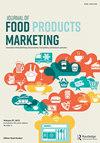下一次可能不在这里:探索购买限量版食品和饮料的动机
IF 2.4
Q2 BUSINESS
引用次数: 0
摘要
摘要在竞争激烈的环境中,食品饮料品牌频繁推出限量版产品,以提高市场份额。在此背景下,本研究旨在调查购买限量版食品和饮料的一般前因。数据是通过399名土耳其客户的问卷副本收集的。研究对象是限量版食品和饮料的实际和/或潜在买家。数据采集采用方便抽样法,采用结构方程建模法对数据进行分析。研究发现,限量版食品和饮料(FABP)的感知稀缺性、预期后悔、态度和购买意愿之间存在正相关关系。结果表明,态度是感知稀缺性购买意愿和预期后悔性购买意愿之间关系的部分中介。该研究还提出了对独特消费品的渴望在限量版FABP的态度和购买意愿之间的关系中的调节作用。食品和饮料品牌在实施限量版策略时,应考虑感知到的稀缺性、预期的遗憾、态度和对独特消费产品变量的渴望。本文章由计算机程序翻译,如有差异,请以英文原文为准。
NEXT TIME IT MIGHT NOT BE HERE: EXPLORING MOTIVATIONS TO PURCHASE LIMITED EDITION FOOD AND BEVERAGE PRODUCTS
ABSTRACT In competitive environments, food and beverage brands frequently launch limited-edition products to increase market share. Within this context, this study aims to investigate the antecedents of purchasing limited-edition food and beverage products in general. Data were collected via copies of questionnaires from 399 Turkish customers. The population of the study is actual and/or potential buyers of limited-edition food and beverage products. Convenience sampling method was used for data collection and the data were analyzed with structural equation modeling method. The study found positive relationships between perceived scarcity, anticipated regret, attitude, and purchase intention of limited-edition food and beverage products (FABP). Results show that attitude is a partial mediator in the relationship between perceived scarcity-purchase intention as well as anticipated regret-purchase intention. The study also presented the moderating role of desire for unique consumer products in the relationship between attitude and purchase intention for limited-edition FABP. Food and beverage brands should consider perceived scarcity, anticipated regret, attitude, and desire for unique consumer product variables while implementing limited-edition strategies.
求助全文
通过发布文献求助,成功后即可免费获取论文全文。
去求助
来源期刊

Journal of Food Products Marketing
BUSINESS-
CiteScore
5.70
自引率
6.90%
发文量
17
期刊介绍:
From food promotion and advertising through new food product development and consumer behavior research, the Journal of Food Products Marketing provides timely, practical articles that keep food marketers on the cutting edge of their profession. The journal includes refereed research studies as well as opinions, guidelines, and speeches by practitioners that contribute to the better practice and understanding of food marketing. The journal provides a single forum for both food marketing academicians and food marketing practitioners.
 求助内容:
求助内容: 应助结果提醒方式:
应助结果提醒方式:


